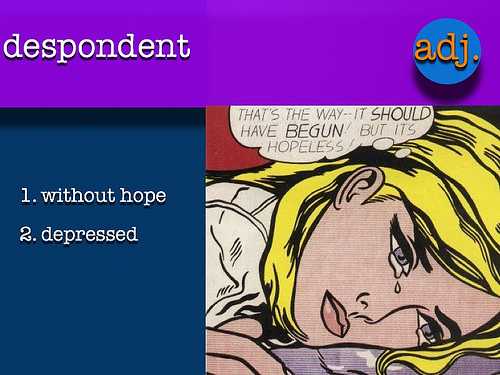It is easy to feel despondent as a teacher. It can seem that an insurmountable list of problems face us as educators in the 21st century. As an English teacher I feel that I am attempting to address the short comings of a society in which reading is under-valued, to engage students who fail to see the value of reading, having grown up in a world of XBOXs and iPods and to deal with a growing number of students who do see reading as valuable but due to the fact that they find it too difficult have completely disengaged from it.
However, I believe that we should not feel despondent. In fact, I believe that we have a duty to feel hopeful looking upon these issues as challenges and opportunities to be addressed rather than just problems to be bemoaned. My students’ vocabulary does not measure up to what my own was like at their age. Okay, this does not make me happy but if that’s the case then I need to do something about it. I need to get them reading! How am I going to do it? I don’t know exactly (because each case is different) but I do have some guiding principles:
- I can not expect my students to want to read so I need to inspire them and help them to see the value in it.
- I need to teach them to overcome their fears about reading and to overcome the barriers that are there stopping them from becoming good readers.
- I must not cut off routes to understanding simply because it does not fit in with my own value system – if they don’t want to use my Oxford dictionary to look up a word but want to use Google instead then that is fine by me.
- I need to offer them the opportunity to read the kinds of texts that they will come into contact with in real life. Every lesson does not have to be about Shakespeare, Austen or Dickens!
- I have a responsibility to read myself and model good reading. The best reader in the room is me so I should not be a lazy teacher and ask them to read all of the time – sometimes they need to hear the words come off of the page as they were meant to.
These are my core beliefs as an English teacher who is passionate about reading and one who tries very hard every day to help his students enjoy and value reading.
Getting kids reading is firmly on my departments’ agenda at the moment. Having been involved in the undoubted success that was #movemeon (via @dajbelshaw) I would like to engage my Twitter PLN in a discussion about how to help young people value reading. I have identifed three types of pupil:
- Those who never read and see no value in it.
- Those who want to read but believe they can’t.
- Those who read the same thing over and over again rather than challenging themselves.
This then calls for three questions:
- How do you help the student who never reads and does not see the value in it?
- How do you help the student who wants to read but won’t because they believe that they can’t?
- How do you help the student who is happy to coast along reading their way through Tracey Beaker or Alex Rider but is unwilling to challenge themselves and read something more involved?
I am going to use the hash tag #edread and have created an archive here at Twapper Keeper to record all of the tweets. I hope that you will help me out and get behind this project.
[Update] I have created a dedicated page here to keep a record of the project – featuring links to any related posts and an archive of all tweets tagged with #edread. I may also turn this into a book – most likely an online pdf but I have not fully thought this bit through yet.
Crowdsourcing seems to be the model of choice at the moment and I am not about to argue with that. I think it is the most effective way for us to collaborate and share ideas. What’s more I thoroughly enjoy it.
Should you have any questions please contact me @jamesmichie.
Image courtesy of“solbronumberone” on Flickr. Found using “Compfight“- a Flickr Search Tool via @iusher.
